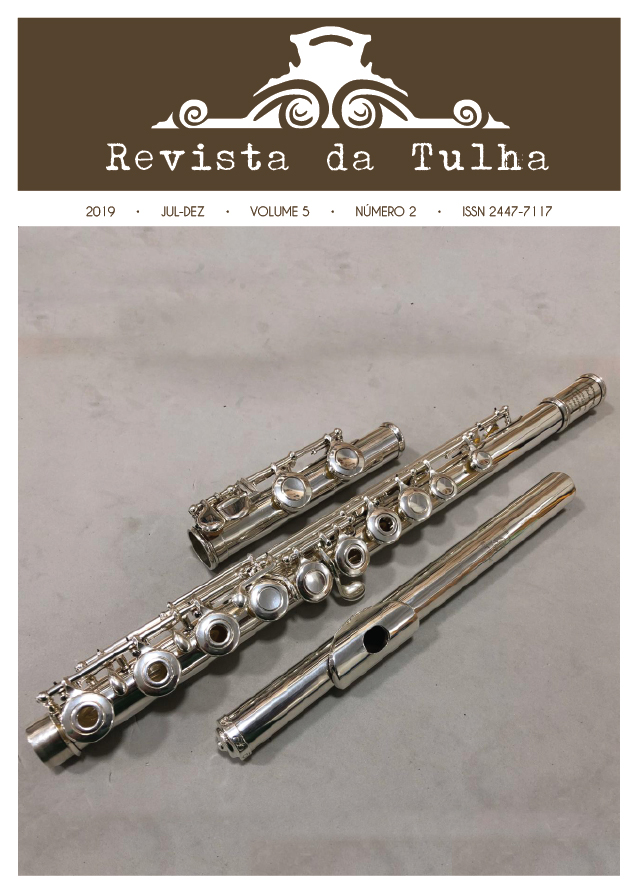Sound and truth: interdisciplinary research in sound and music composition
DOI:
https://doi.org/10.11606/issn.2447-7117.rt.2019.165091Keywords:
Sound, Technology, Torture, Paradigm, DeviceAbstract
This article examines some aspects my recent interdisciplinary research on sound phenomenology and musical composition, which explores philosophical, cultural, social, and political issues and engage a subjective and multipolar dialog with technology. New forms of technologically mediated listening, new processes of producing, manipulating, and transforming sound shape our lives and occupy our physical and existential living spaces. Wittgenstein suggests that sound is only the surface of music and that the musical work conceals something more profound that can hardly be described by logical-philosophical models or scientific theories. As an illustration of my compositional work, I discuss some ideas of my work The Refrigerator (2014), digital oratorio that thematizes my experience of torture during the military dictatorship in Brazil and reflects on Camus existential philosophical concept of absurdity. Husserl’s phenomenology of time consciousness supports my research on sound phenomenology focused on electroacoustic music. Based on Kuhn’s concept of scientific paradigm, I draft the idea of an electroacoustic paradigm as disciplinary matrix of contemporary music. I examine the concept of apparatus from the points of view of Agamben and Flusser as a key notion for understanding the current phase of capitalism and the structures of communication and creativity of the cybernetic society. Finally, I discuss Heidegger’s view of truth as the essence of art. Art help us to develop a new understanding of the being that moves from a modern aesthetic experience of an art object to a post-modern approach to the work of art. The university is a privileged environment to observe interdisciplinary connections between artistic disciplines and the intersections between art, technology, and society. The university’s role is not only to interpret and spread scientific and humanistic knowledge but to embrace cultural diversity by offering multiple perspectives for advancing research and critical thinking.
Downloads
References
AGAMBEN, Giorgio. What Is an Apparatus? and Other Essays (Meridian: Crossing Aesthetics). Transl. by D. Kishik and S. Pedatella. Stanford, CA: Stanford University Press, 2009.
ARENDT, Hannah. Eichmann in Jerusalem: A Report on the Banality of Evil. New York: Penguin Books, 1963.
ATTALI, Jacques. Noise: The Political Economy of Music. Translated by Brian Massumi. Minneapolis: University of Minnesota Press, 1985.
CAMUS, Albert. The Myth of Sisyphus and Other Essays. Translated by J. O’Brien. New York: Vintage, 1955.
CAMUS, Albert. Le Mythe de Sisyphe: Essai sur l’Absurde. Paris: Gallimard, 1996 [1942].
Chagas, Paulo C. “The Blindness Paradigm: The Visibility and Invisibility of the Body”. Contemporary Review, 25:1/2, 119-30, 2006.
Chagas, Paulo C. “Polyphony and Technology in Interdisciplinary Composition.” Proceedings of the 11th Brazilian Symposium on Computer Music, 47-58. São Paulo: IME/ECA, 2007.
Chagas, Paulo C. Unsayable Music: Six Reflections on Musical Semiotics, Electroacoustic and Digital Music. Leuven: University of Leuven Press, 2014.
Chagas, Paulo C. “Musical Understanding: Wittgenstein, Ethics, and Aesthetics.” Music, Analysis, Experience: New Perspectives in Musical Semiotics, edited by C. Maeder and M. Reybrouck, 115-33. Leuven: Leuven University Press, 2015.
Chagas, Paulo C. “Revolt and Ambivalence: Music, Torture and Absurdity in the Digital Oratorio The Refrigerator.” Bridging People and Sound. CMMR 2016. Lecture Notes in Computer Science, vol. 10525, edited by M. Aramaki, R. Kronland-Martinet and S. Ystad, 331-46. New York: Springer International Publishing, 2017.
DREYFUS, Hubert. “Heidegger’s Ontology of Art”. In A Companion to Heidegger, edited by H. Dreyfus and M. Wrathall, 407-19. London: Blackwell, 2005.
FLUSSER, Vilém. Pós-História: Vinte Instantâneos e um Modo de Usar. São Paulo: Livraria Duas Cidades, 1983a.
FLUSSER, Vilém. Für eine Philosophie der Fotografie. Göttingen: European Photography, 1983b.
FLUSSER, Vilém. Ins Universum der technischen Bilder. Göttingen: European Photography, 1985.
FLUSSER, Vilém. Vom Stand der Dinge: Eine kleine Philosophie des Designs. Göttingen: Steidl Verlag, 1997.
FLUSSER, Vilém. The Shape of Things: A Philosophy of Design. London: Reaktion Books, 1999.
FLUSSER, Vilém. Towards a Philosophy of Photography. Translated by A. Mathews. London: Reaction Books, 2000.
FLUSSER, Vilém. Into the Universe of Technical Images. Translated by Nancy Ann Roth. Minneapolis: University of Minnesota Press, 2011.
HEIDEGGER, Martin. Holzwege. Frankfurt am Main: Vittorio Klostermann, 1950.
HEIDEGGER, Martin. Basic Writings. Edited by David Farrell Krell. San Francisco: Harper Perennial, 1993.
HUSSERL, Edmund. Zur Phänomenologie des inneren Zeitbewußtseins (1893-1917). Husserliana X. Edited by R. Boehm. The Hague: M. Nijhoff, 1966.
HUSSERL, Edmund. On the Phenomenology of the Consciousness of Internal Time (1893-1917). Translated by J. _Brough. Boston; Dordrecht: Kluwer Academic Publishers, 1991.
KUHN, Thomas. The Structure of Scientific Revolutions, 4th ed. Chicago: University of Chicago Press, 2012.
LUHMANN, Niklas. Die Kunst der Gesellschaft. Frankfurt am Main: Suhrkamp, 1997.
LUHMANN, Niklas. Art as Social System. Translated by Eva M. Knodt. Stanford, CA: Stanford University Press, 2000.
POUSSEUR, Henri. Fragments théoriques I: sur la musique expérimentale. Brussels: Editions de l’Institut de Sociologie de l’Université Libre de Bruxelles, 1970.
THOMSON, Iain. "Heidegger's Aesthetics", In The Stanford Encyclopedia of Philosophy (Fall 2015 Edition), ed. by Edward N. Zalta, 2015. Disponível em <https://plato.stanford.edu/archives/fall2015/entries/heidegger-aesthetics/>. Acesso em: 05 de outubro de 2019.
WITTGENSTEIN, Ludwig. Tractatus Logico-Philosophicus. Translated by D. F. Pears and B. F. McGuiness. London; New York: Routledge, 1974.
WITTGENSTEIN, Ludwig. Logisch-philosophische Abhandlung. Tractatus logico-philosophicus. Tagebücher 1914-16. Suhrkamp: Frankfurt am Main, 2003.
WITTGENSTEIN, Ludwig. Philosophische Untersuchungen. Philosophical Investigations. Translated by G. E. M. Anscombe, P. M. S. Hacker and Joachim Schulte. Rev. 4th ed. By P. M. S. Hacker and Joachim Schulte. Oxford: Wiley-Blackwell, 2009.
WRATHALL, Mark. How To Read Heidegger. London: Granta Publications, 2005.
Downloads
Published
Issue
Section
License

This work is licensed under a Creative Commons Attribution 4.0 International License.
Authors retain copyright and grant the journal the right to first publication, with the work licensed under the Creative Commons Attribution License CC-BY-NC:
This work is licensed under a Creative Commons Attribution 4.0 International License.



